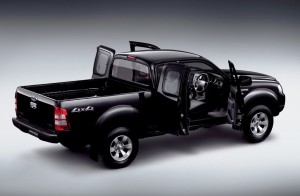It was once among the most popular trucks in America, but two recent events suggest the Ford Ranger will soon go away – or will it?
Despite the offer of significant new incentives from the State of Minnesota to keep open the current U.S. Ranger plant, Ford says the factory doesn’t have any use after 2012, when it plans to pull the truck from production. At the same time, Ford is investing $350 million – along with Japanese partner Mazda – in a Thai plant that will build the new Ranger. But there are no plans to bring that truck to the U.S.
Ford isn’t the only one fleeing the compact pickup segment at home. Chrysler has said the Dodge Dakota will end production next year, though Dakota may be replaced by a small unibody pickup. Chevrolet Colorado and GMC Canyon production is also expected to end by 2012, leaving only Toyota, Nissan and potentially India’s Mahindra & Mahindra as the remaining players in the U.S. small pickup market.
The segment has declined steeply over the last decade in the U.S. because buyers have fled compact and midsize trucks as their sizes have increased along with prices to near full-size levels and the platforms have aged in favor of updates for light- and heavy-duty pickups, which have higher profit margins.
That suggests there are two primary obstacles preventing the future overseas Ranger from showing up here: Ford’s all-new engine lineup for the 2011 F-150 half-ton pickup, which includes a new, fuel-efficient Duratec 3.7-liter V-6, and the so-called “chicken tax” which imposes a pricey 25 percent import tax on pickups manufactured in most countries outside the U.S., including Thailand.
The term “chicken tax” originated in the early ’60s during a trade dispute between the U.S. and Europe over U.S.-imported chickens, which were slapped with a special tax to protect West German farmers. The U.S. responded by slapping a 25% tariff on trucks imported from Europe.
There are countries, though, where the chicken tax doesn’t apply because of special trade agreements with the U.S., such as Australia and Mexico.
In addition to Thailand, Ford will also build the next-generation Ranger T6 at a second site in South Africa, at its Silverton factory in Pretoria. South Africa isn’t subject to the chicken tax because the country is part of the African Growth and Opportunity Act that was signed into law in 2000.
AGOA provides incentives for American companies to trade and invest with African countries that meet certain conditions, such as eliminating commerce barriers and promoting human rights. The countries can also export goods to the U.S. duty-free, including pickup trucks.
It’s possible that under AGOA, Ford could decide to import the Ranger T6 to the U.S. (with certain modifications required to meet federal emissions and safety standards) and avoid the chicken tax.
Ranger T6 production is scheduled to start in South Africa by the end of 2011, about the same time that U.S. Ranger production is winding down.
But there’s risk in such a move for Ford. Unless it’s extended by the federal government, AGOA will expire in 2015, and South Africa, along with 39 other African nations, will lose the special tax-free trade status. Ford could get caught scrambling for a third assembly line in a chicken tax-free country if Ranger T6 sales take off in the U.S. beyond 2015.
Still, three years could be enough time for Ford to test if small-truck buyers are still serious about small trucks. If they are, finding a suitable source for Ranger would be a relatively easy matter.
Mike Levine is Editor-in-Chief of PickupTrucks.com

